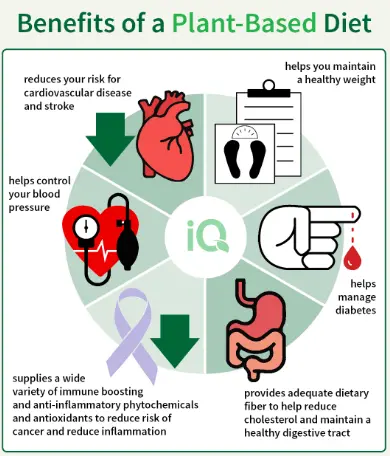Plant Based Foods And Diet Examples
There are many examples of plant based foods. Plant Foods are essential natural foods in our diet. They have an important nutritional value in a balanced diet.

Plant based foods are often confused with organic products, but they have some differences because organic products are products that have been obtained using technologies that do not affect the environment and have not been treated with pesticides, herbicides or antibiotics.
What is the meaning of Plant Based Food?
Plant foods are those that come from plants and are used in our diet, whether raw or processed. All these are products obtained in gardens and fields. They are important for their vitamin, fiber and mineral content.
Types Of Plant Foods
This food group includes vegetables, legumes, tubers, cereals, bulbs and fruit. Vegetables are those parts of which we eat green, i.e. leaves, stems or inflorescences, legumes are those whose seeds or pods are eaten.

The tubers are those that are formed following the expansion of the root of the plant and constitute a supply of nutrients.
Cereals
Cereals are products obtained from the seeds of certain plants and processed for consumption, in their natural state or in the form of oils and fats. Even bulbs, like garlic, are nutrient reserves for plants based foods examples.
See Also: Effective Tips to Lose Belly Fat and Live a Healthier Life
What are the Examples of Plant Based Foods?
There are many examples of plant foods:
-
Fruits
Aubergines, peppers, tomatoes, oranges, tangerines, bananas, grapes, avocados and others:
-
Bulbs
Garlic, onion, leek, green onion, shallot and fennel.
-
Coles
Broccoli, Broccoli, Green Kale, Brussel Sprouts, Cauliflower, Kale, White Cabbage, and Red Cabbage.
-
Leaves and stems
Sorrel, watercress, chard, cardoons, borage, escarole, asparagus, celery, turnip tops, spinach and lettuce.
-
Tubers
Chicory, salsify, turnips, radishes, carrots, beets, carrots and parsnips.
-
Cereals
Oats, teff flakes, buckwheat, millet, corn, spelled, bran, barley, quinoa and rye.
-
Inflorescences
Artichoke.
-
Legumes
Peas, green beans, green beans, broad beans, peas and chickpeas.
-
Peponides
Pumpkins, courgettes and cucumbers.
-
Nuts
Walnuts, almonds, peanuts, pistachios and others.
-
Oils
They come from cereals and some seeds such as corn, sunflower, soy and olive.
Benefits of plant based foods

-
Plant Based Foods That Help Lower Your Cancer
Plant foods contain cellulose, fiber, chlorophyll, water, vitamins, water-soluble pigments or flavonoids, organic and inorganic salts, sugars, sulfur-rich compounds and other substances with antioxidant and nutritional properties that can prevent cancer.
They contain a small amount of lipids, consisting of carotenoids, lutein and other beneficial substances and antioxidants.
-
Get Essential Vitamins
The main vitamins in plant products include carotenes, vitamins of group B, C and others.
-
Get Minerals
The most common minerals in plant foods are potassium, calcium, magnesium, sodium, phosphorus and chlorine.
-
Best Foods To Recover When You’re Sick
They contain organic acids and phenolic compounds that have healing properties that help recover from past illnesses or prevent degenerative diseases.
-
Various Plant Foods That Are fulfills with diet or protein
Some plant foods such as soy, legumes and dried fruit are very rich in protein and amino acids and are great for supplementing our diet or meeting our protein needs if you follow a vegan or vegetarian diet.
-
Most Energy Source Foods
They also contain carbohydrates, substances such as starch, a polysaccharide which contains various glucose molecules which our body uses as a direct source of energy.